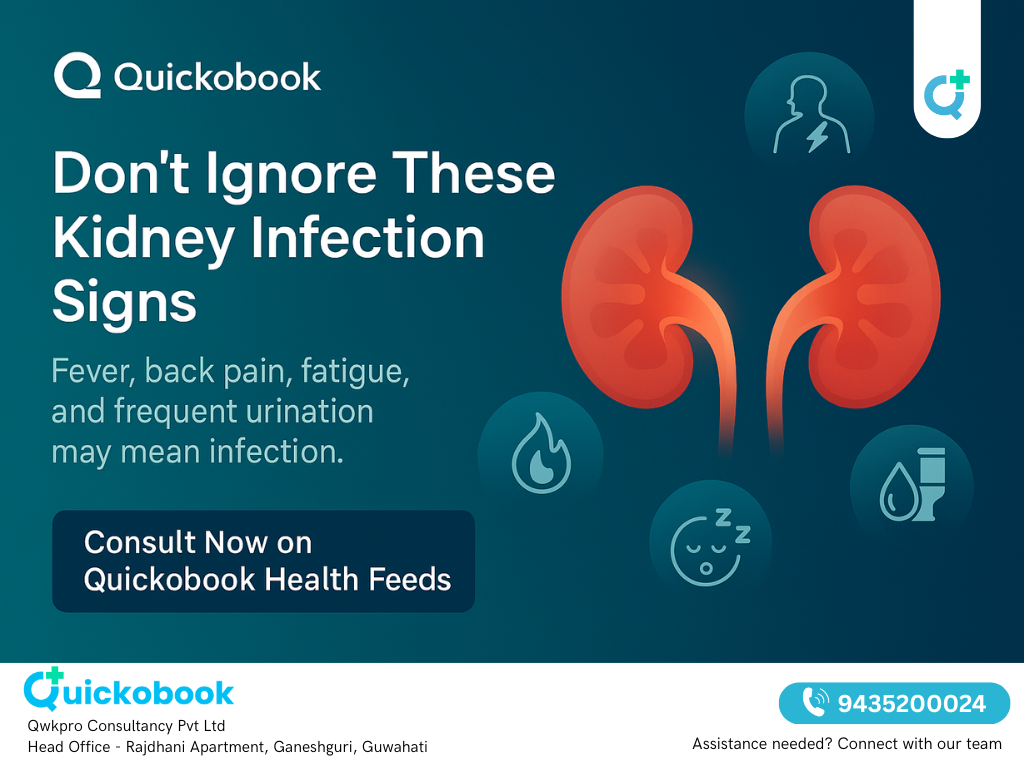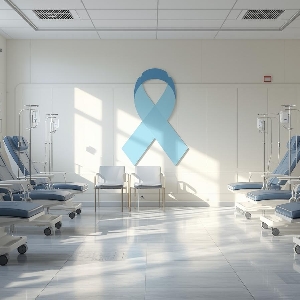Introduction
Your kidneys are your body’s natural filters, working non-stop to remove toxins and balance fluids. But when bacteria reach the kidneys through the urinary tract, they can cause a kidney infection (also known as pyelonephritis).
Ignoring the early signs can lead to serious complications — including permanent kidney damage or blood infections. Recognizing symptoms early and consulting a nephrologist or general physician through Quickobook can save your kidneys and overall health.
Understanding Kidney Infections
A kidney infection usually starts as a urinary tract infection (UTI) that spreads upward from the bladder. Women are more prone to these infections, but men and children can also be affected.
The most common bacteria responsible is E. coli, which lives in the intestines but can enter the urinary tract. Other causes include kidney stones, weak immunity, or urinary blockages.
Major Signs of Kidney Infection You Should Never Ignore
1. Persistent Kidney Pain or Back Pain
Pain on one or both sides of your lower back, just below the ribs, is a classic symptom. This kidney pain may feel dull, throbbing, or sharp and can worsen with movement or touch.
If your back pain is accompanied by fever or urinary changes, it’s time to see a nephrologist immediately.
2. Fever and Chills
A high fever (above 101°F or 38°C) with shaking chills often indicates that the infection has spread beyond the bladder to the kidneys. Fever with kidney pain is a medical red flag that requires urgent care.
3. Burning or Painful Urination
A stinging or burning sensation while passing urine suggests an infection in the urinary tract. When this symptom combines with back pain or fever, it signals that the infection might have reached the kidneys.
4. Frequent or Urgent Need to Urinate
You may feel like urinating often but pass only small amounts each time. This is due to irritation of the urinary tract and inflammation near the bladder or kidneys.
5. Blood in Urine (Hematuria)
If your urine appears pink, red, or brownish, it could contain blood — a common sign of kidney infection or stones. Never ignore blood in urine, as it always needs medical evaluation.
6. Cloudy or Foul-Smelling Urine
A strong odor or cloudy urine may indicate pus or bacteria in the urinary tract. It’s a clear signal that the kidneys are fighting an infection.
7. Nausea, Vomiting, or Fatigue
As infection spreads, toxins build up in the body, leading to weakness, loss of appetite, or vomiting. These symptoms show that your kidneys are under stress and need immediate medical help.
8. Swelling in Feet, Hands, or Face
Swelling indicates your kidneys are not removing excess fluids properly. This can happen in severe kidney infections or when both kidneys are affected.
READ ALSO: Best Diet For Healthy Kidneys
Causes and Risk Factors
You’re more likely to get a kidney infection if you:
- Have frequent UTIs or untreated bladder infections
- Suffer from kidney stones
- Have diabetes or low immunity
- Are pregnant
- Use urinary catheters or have urinary tract blockages
- Don’t drink enough water
Prevention Tips for Kidney Infection
- Stay hydrated — drink 2–3 litres of water daily.
- Urinate frequently — don’t hold your pee for long.
- Practice good hygiene — wipe from front to back after using the toilet.
- Avoid excessive caffeine and alcohol.
- Urinate after intercourse — helps flush bacteria out.
- Eat a balanced diet rich in fruits, vegetables, and fibre.
- Get regular medical checkups, especially if you have diabetes or high BP.
Diagnosis of Kidney Infection
Your doctor will usually recommend:
- Urine test (urinalysis): To detect bacteria or pus
- Urine culture: To identify the exact bacteria causing infection
- Blood test: To check for infection spread
- Ultrasound or CT scan: To detect stones or blockages
Early diagnosis and treatment prevent complications and preserve kidney function.
Treatment Options
Treatment depends on severity:
- Antibiotics: First-line therapy prescribed by a general physician or nephrologist
- Pain relief and fluids: To reduce discomfort and dehydration
- Hospitalization: Needed for severe cases with high fever or vomiting
- Follow-up tests: To confirm infection has cleared
Avoid self-medicating or taking leftover antibiotics — this can worsen the infection or cause resistance.
Home Care and Recovery
- Drink plenty of water to flush bacteria out.
- Take medicines exactly as prescribed.
- Get enough rest and avoid heavy exertion.
- Apply a warm compress on your lower back to ease kidney pain.
- Avoid caffeine, alcohol, and spicy food until recovery.
When to See a Doctor Immediately
Seek urgent care if you have:
- Severe kidney pain
- Fever above 102°F
- Vomiting or inability to keep fluids down
- Blood in urine
- Swelling in legs or face
Don’t delay — book an appointment on Quickobook to consult a nephrologist or general physician near you. Early treatment can prevent kidney damage and sepsis.
50 FAQs on Kidney Infection and Pain
Q1. What does kidney pain feel like?
A1. It’s usually a dull ache on one or both sides of your back, below the ribs.
Q2. Can a kidney infection cause back pain only?
A2. Yes, but it’s often accompanied by fever, chills, or urinary symptoms.
Q3. What is the most common cause of kidney infection?
A3. A bacterial UTI that spreads to the kidneys.
Q4. Can kidney infection go away without antibiotics?
A4. No, medical treatment is necessary to avoid complications.
Q5. How fast does a kidney infection develop?
A5. It can progress from a bladder infection within 1–2 days.
Q6. Can dehydration cause kidney pain?
A6. Yes, dehydration makes infections and stones more likely.
Q7. Is fever always present in kidney infection?
A7. Usually yes, but mild cases may have only pain or fatigue.
Q8. How do doctors diagnose kidney infection?
A8. Through urine tests, blood tests, and imaging.
Q9. Can kidney infection cause swelling?
A9. Yes, due to poor fluid removal by the kidneys.
Q10. Should I see a nephrologist or general physician first?
A10. Start with a general physician; they’ll refer you to a nephrologist if needed.
Q11. Can kidney infections lead to kidney failure?
A11. Yes, untreated infections can damage kidney tissue permanently.
Q12. What foods help fight kidney infection?
A12. Fruits like cranberries, papaya, and apples, plus lots of water.
Q13. Can stress cause kidney pain?
A13. Stress itself doesn’t cause infection, but it can worsen symptoms.
Q14. How can I relieve kidney pain naturally?
A14. Stay hydrated, rest, and apply warmth; see a doctor if pain persists.
Q15. Is blood in urine always serious?
A15. Yes, it requires medical investigation.
Q16. Can kidney infection affect both kidneys?
A16. Yes, though usually one is affected first.
Q17. Is kidney pain worse at night?
A17. It can be, especially if lying increases pressure on the infected side.
Q18. How long does recovery take?
A18. Most mild infections clear within 7–10 days of antibiotics.
Q19. Can UTIs turn into kidney infections?
A19. Yes, if left untreated.
Q20. Are kidney infections contagious?
A20. No, but the bacteria that cause them can spread via poor hygiene.
Conclusion
Kidney pain is not just a backache — it can signal a serious infection. Ignoring the symptoms or delaying treatment can lead to chronic kidney damage or even life-threatening complications.
Don’t wait for pain to worsen.
Book a consultation with a trusted nephrologist or general physician on Quickobook.com today and take the first step towards healthy kidneys.
Disclaimer
This article is for general awareness and not a substitute for medical advice. Always consult a qualified general physician or nephrologist before taking or stopping any medication.










Comments (0)
No comments yet. Be the first to share your thoughts!
Leave a Comment